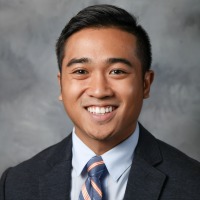
This post was written by Bryan Dosono (@bdosono), who received a DLF Students & New Professionals Fellowship to attend the 2018 Forum. It can also be found as a Medium post from the author.
Bryan Dosono is a PhD Candidate at the Syracuse University School of Information Studies. He employs social network analysis with qualitative research methods to explore, interpret, and visualize large collections of social media data.
He seeks to understand how Asian Americans and Pacific Islanders (AAPIs) construct and express their identity in online communities and his dissertation research uncovers the ways in which AAPIs negotiate collective action in the context of online identity work. Learn more about his research at http://www.bdosono.com/.
In my first Digital Library Federation Forum, I had the honor of attending as a recipient of the Students & New Professionals Fellowship. The conference took place in Las Vegas, Nevada, situated on the lands of the Southern Paiute people. The conference opened with an inspirational keynote address from Anasuya Sengupta, a prominent digital activist who works to center the knowledge of different marginalized communities on the Internet.
Sengupta shared that while the breadth of humanity’ knowledge is oral and experiential, we tend to give more authority to the textual knowledge that has been published in books and related forms of printed publication. Alarmingly, she shared that only around 20% of public knowledge (inclusive of domain name registration, Wikipedia edits, GitHub commits) is produced on or by people from the Global South (i.e., Africa, Latin America, Asia, and the Pacific Islands). Upon realizing the colonial thrusts of her own education, she began her personal journey of decolonizing her sense of self-worth through deliberate choices she has made in reading books from non-Western authors and actively practicing the spoken languages (what she references as her superpowers) passed down by her parents.
Listening to Sengupta’s intentional acts of self-decolonization also made reminded me of the critical need to decolonize myself and the research I am conducting for my doctoral dissertation. I am largely interested in studying online identity work within Asian American and Pacific Islander (AAPI) communities. The keynote led me to question why some narratives mainstream and others marginalized. I have now been inspired to add a component of decolonization to my research studies. Reflexively, how can I play my part to ensure AAPI narratives are accessible and inclusive? Knowledge, from the beginning, has and always will be a political construct. Imperial, hegemonic structures dictate what type of content gets published and what does not.
The keynote led me to question why some narratives mainstream and others marginalized. I have now been inspired to add a component of decolonization to my research studies. Reflexively, how can I play my part to ensure AAPI narratives are accessible and inclusive?
Colonization is problematic because the colonized are conditioned to believe they are different and, therefore, inferior. For instance, identity conflict distances the colonized from their authentic heritage. Since I was born and raised in a rural area of Washington State where AAPIs comprised of less than 1% of the county’s demographics, questions like “am I Filipino enough?” or “what are you?” became a recurring thought as I began to reflect upon my racial identity during my K-12 years.
The biggest takeaway I received from the conference was to look beyond Anglo-centric productions of knowledge as the only valid form of arriving at a truth. The beauty of decolonization is that it diversifies perspectives by affirming different ways and systems of knowing. Perhaps the academy should encourage more efforts to decolonize how we educate the minds of the next generation. Per Sengupta, if we do not have unfettered access to our history, we cannot fight to improve our future.
Want to know more about the DLF Forum Fellowship Program? Check out last year’s call for applications.
If you’d like to get involved with the scholarship committee for the 2019 Forum (October 13-16, 2019 in Tampa, FL), look for the Planning Committee sign-up form later this year. More information about 2019 fellowships will be posted in late spring.
